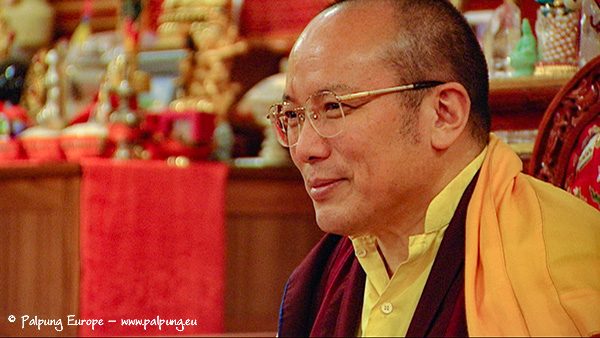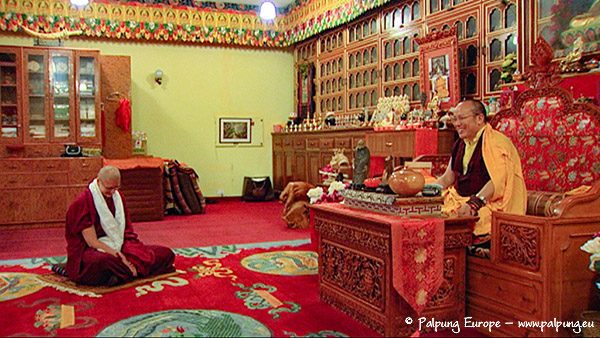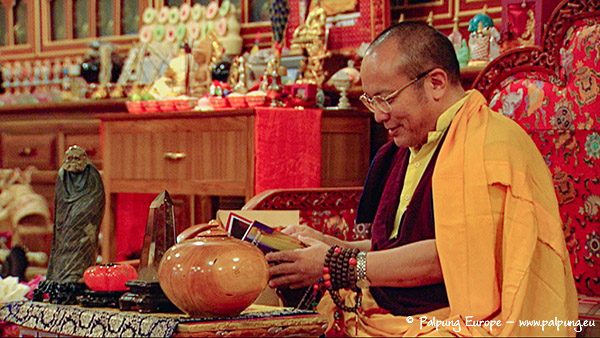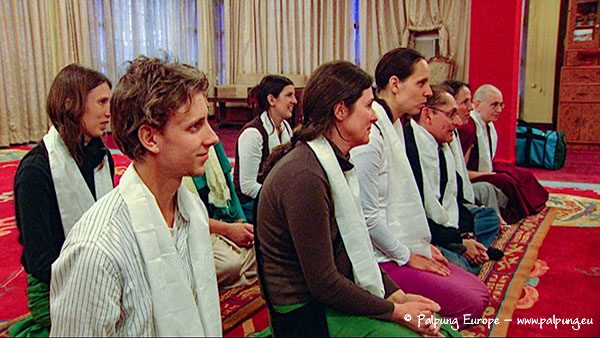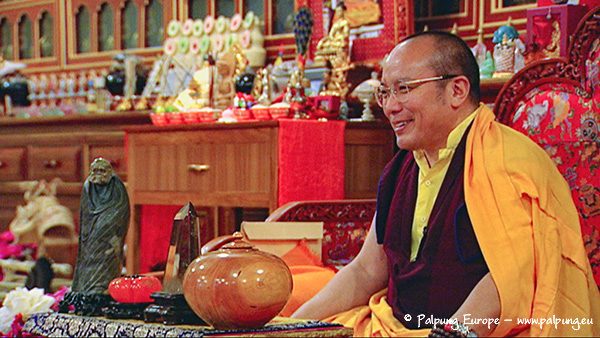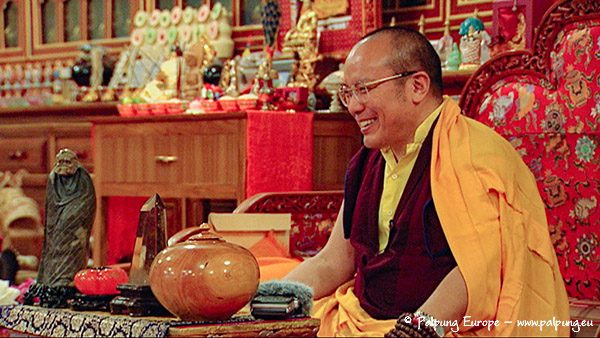Audience with H.H. Chamgon Kenting Tai Situ Rinpoche
Our pilgrimage 2009 to India was crowned by an audience which Guru Vajradhara H.H. Chamgon Kenting Tai Situ Rinpoche granted us. While still in retreat Rinpoche bestowed on us a one hour teaching and transmission in one of the breaks inbetween his meditation sessions. Chöje Lama Palmo had requested a teaching on refuge and bodhicitta for us and H.H. Chamgon Kenting Tai Situ Rinpoche presented us with it.
This is transcript of the transmission from and through H.H. Chamgon Kenting Tai Situ Rinpoche:
Refuge
Refuge is the most basic step. You take refuge in buddha, you take refuge in dharma, you take refuge in sangha. It means that you want to follow the teaching of Lord Buddha. Therefore you take refuge in buddha Buddha. And you want to follow the dharma which is Buddha’s teaching, so that is the taking refuge in dharma. And you want to learn dharma from the lineage, not just by yourself, from a book, from your own idea but in the same way as Buddha taught the dharma, as it was continued in the lineage in the past for more than 25 centuries. And this you want to learn from the sangha. In this way you are taking refuge in the Buddha, dharma, sangha
Sangha
Of course, I know very well that in the West sangha means every Buddhist, every Buddhist is called sangha. I can understand that because there are very few Buddhists and these few Buddhists are not just scholars, not just devotees, not just supporters but all of them are practitioners. Every Buddhist in the West is practising Buddhism, they meditate, they pray. So that way I can understand why in the West laymen, laywomen are also called sangha.
But in Buddhism even if it is widespread and even if everyone in the whole country is Buddhist, then we can not call everybody sangha. Like in Tibet for example we have all kinds of people doing all kind of things in life: growing food, herding animals, doing trade, holding offices and they are not sangha. They are Buddhists but they are not sangha. Therefor for us when we say sangha it means three things:
First the very clear and obvious sangha is ordained monks and nuns. And then secondly those who are not so visible that means, not so easy to detect that is those who have bodhicitta. Those who practice bodhicitta and reached at least close to the first level bodhisattva. We call them sangha, holy sangha. And then the true holy sangha will be like Manjusri, like Avalokitesvara, like Vajrapani. There are eight great bodhisattvas and also many others who are following their example who have similar attainments.
The third aspect of sangha is the yogis who do nothing but practice: the practice of the Vinaya, the practice of the Sutra, and the practice of the Tantra so all three yanas are practiced by them. That is yogis such as Milarepa, Marpa for example. This aspect is the highest of the sangha.
So when we say sangha and take refuge in sangha we mean this. As now I explained it to you in this way I have therefor no problem that in the West every Buddhist is called sangha. That is o. k. It is nice. If you know what sangha really means then it becomes healthier. Without knowing that then sangha become something like a member, member of the group, member of the organization and sangha is so much more than that.
Buddha
Now when we say Buddha we have to know that we are not only talking about Prince Siddharta. We are talking about Prince Siddharta of course, he is our Buddha. But we are not only talking about him. We are talking about all the Buddhas. During the few minutes we already spent here in this room, right here many sentient beings throughout space reached buddhahood.
Solely our galaxy has a, in Tibetan we say “third thousand”. That means: one thousand times one thousand times one thousand solar systems. And this galaxy is one of the countless galaxies throughout space, filled with sentient beings. So if you say in every billion galaxie, in every one billion centuries, one sentient being reaches buddhahood, even you make that kind of outrageous calculation then still it will mean that every second, every moment countless sentient beings have to become Buddha. Even with that kind of calculation. This is how we are talking about all the Buddha. And specifically, of course, our Buddha: Prince Siddharta, Buddha Shakyamuni.
Dharma
This makes quite clear what dharma is. The dharma which we have on paper is much more than we have in lineage because many of our books, many of our texts don’t have lineage anymore. We enshrine them, we respect them, but we can’t study them, we can’t practice them. Perhaps we can make research on them. But we don’t do research upon the dharma for which we have lineage. We don’t speculate upon it but we practice it. We receive transmissions and we practice them and that is dharma, to which we take refuge just like Buddha Shakyamuni to whom we take refuge.
Then we are taking refuge to all the buddha. The same way we are taking refuge to all the dharma. That means: dharma is relative truth which will lead us to the ultimate truth. Dharma always manifests in relative, e. g. in one volume of dharma, you can find maybe 400 or 500 pages and each page will have several lines. And these lines and these pages and these volumes can not speak about everything. So in this way the dharma on black and white is limited. But by practicing the dharma which we have through lineage and with lineage we will realize the true dharma, the ultimate which has no limitation. So that is taking refuge in the dharma. And sangha is as I told you the source of the lineage.
We are practicing dharma to reach buddhahood. I am quite sure that many people of this world who have never heard the word “Buddha” have no idea what Buddha is. That is fair. But then there are many who heard the word Buddha and who might have a very strange idea of what Buddha is. That is not very correct but acceptable. But then: those who call themselves Buddhists might have very strange ideas about what Buddha is. That would be absolutely not correct. Therefor we have to know that we are practicing the dharma to become Buddha.
We are not at Buddha’s mercy. We are not depending on Buddha. (Seen from this perspective) we are independent from Buddha. We want to reach buddhahood to liberate all sentient beings into buddhahood. So this way we have devotion to the Buddha and at the same time we have compassion to all sentient beings.
Compassion
Of course it is easy to appreciate what bodhicitta is, what compassion is in a kind of egoistic, ego friendly manner. “You are so poor, you are so sick, you are so uneducated, you are so underprivileged and you are so weak therefor I have compassion for you.” That kind of compassion is easy, easy to talk about and easy to develop because it is ego friendly. “I am better than you so I can help you. I’m not wounded you have broken your leg so I can carry you. You don’t have food, I have food so I can give you some. You don’t know anything, I know everything so I can teach you something” and so on and so forth.
“Poor thing, I have pitty for you”. That is good, it is not bad, it is good. This kind of compassion is good but not good enough. Because it is discriminating, it is partial, it is dualistic. Why is it not good enough? Because this compassion will not lead you to buddhahood. This compassion will make you a better person, and through this compassion as a result of your karma of being a better person, in your next life you will be stronger, you will be healthier, you will have more power, you will have more money, you will look nicer and all of that. But then, where will that lead to? You will never know. Because you are more powerful you might use your power for wrong purposes. That is a possibility. You look good and therefor you will spend lots of time taking care of yourself. And you are healthy so that you will be able to do so many things that unhealthy people are not able to do. In this way the things you might do might be good things, might be not so good things. There is no guarantee.
Bodhisattva compassion
If the compassion is bodhisattva compassion which means: “I wish to attain buddhahood for the benefit of all sentient beings to reach buddhahood”, then that is the true bodhisattva compassion: to liberate all sentient beings from the suffering of samsara. Why is that so important? Well, wether you are Westerners or nor, there is no difference.
West and East
Sometimes there is this very idiotic, ridiculous question that people ask: “is Buddhism relevant to Westerners the same way it is relevant to Easterns?” What is that supposed to mean? If I go West, I will end up in the East. So where is the West, where is the East? One should thing very carefully, before one says things.
And they also say oriental and occidental. What is that supposed to mean? You know oriental is occidental for the occidentals and occidental is oriental for the orientals. It doesn’t mean anything. That is just words created by people.
Buddhism is relevant for as long as you don’t like to suffer, for as long as you like to be happy. It is this potential that everybody likes to be happy and free. And nobody likes to be suffering and also to be limited. So in this way buddhahood is the limitless freedom and liberation which has no limitation, which has no dualistic stain. That is buddhahood. And until you reach that, your happiness, your joy, your kind of pleasure will always have a very high price tag attached with onto it.
Every aspect of happiness and joy which is related to ego, self, attachment, jealousy, pride, ignorance, then this happiness, the more you have it, when you loose it, you will suffer more. In this way we should at the same time know that the relative worldly dualistic happiness, joy and freedom we are seeking for, we will be seeking for, really doesn’t mean anything.
As soon as you have it you can only loose it. It is impermanent. Look at the map of the world. A few million years ago the whole earth, the land of this planet stuck together and was a big lump. And then slowly, slowly it moved with a speed that is about the speed of the growth of our hair. So with that kind of speed it moved from one to another, it turned into a totally different shape after a couple of million years. And believe it or not: where you are right now was close to south Africa a couple of million years back. And now it is here. And it is moving northwards with the speed of the growth of your hair and after many millions of years all of the land of planet earth will be a big lump again. All united. And all the ocean will be in one place and all the land will be in another place. It was like that and it will be like that. Right now it is nicely spread out into continents.
So even in the relative world, relative of the relative of the relative, even if you look at that, everything is impermanent. So therefor except for enlightenment, everything is impermanent, everything is relative whether you are oriental, whether you are occidental, whether you are Westerners or Northerners, or Southerners or Easterners or Centrals or whatever you are. Actually you should learn a little bit about chasing the sun. Then you will know what East and what West is.
So when you know what North and what South is it is clear. Because North and South is more distinctive then East and West. If for example you go on the northpole you see nothing but South but if you go to the southpole you see nothing but North, so that is more distinctive. But East and West are absolutely superficial, you just have to chase the sun. Unless you believe that all of yesterdays’ suns are stacked up over there in the West and all of tomorrows’ suns are stacked up in the East and are ready to be released into the sky like weather balloons. If you believe things like that then that’s a different story. But I don’t think you are that stupid.
Universal truth
Anyway with due respect I think dharma is universal truth and Buddhism is representing the dharma in a most distinctive, most complete manner. Not because it is better than anything, not because it is worse than anything because it has maintained its living lineage.
Although we lost much of the lineage of Lord Buddha’s teaching but that which is left here today in the 21st century after 2500 years there is still more than enough pure dharma with pure lineage left. So by practicing it each and everyone of us can reach buddhahood and each and everyone of us can liberate each and everyone of the sentient beings in the entire universe and beyond. So therefor bodhicitta is absolutely important and an absolute must as a Vajrayana Buddhist.
If you wish to reach buddhahood without bodhicitta it will never happen. How can you reach buddhahood by accident, how can you reach buddhahood although you have no idea about it, how to reach it if you don’t even want to reach it and how can you reach buddhahood if it is not for all the sentient beings? How can you reach buddhahood if it is not for the buddhahood of all sentient beings? Therefor bodhicitta is absolutely essential. With this, I think I explained to you the most important true steps in Buddhism, Vajrayana Buddhism: refuge and bodhicitta.
Devotion and compassion
And then let’s look at another very important practice: the practice of devotion and compassion. If you have lots of devotion and no compassion then you will feel like the most inferior being in the whole universe. You are down there and you are just looking up to the sky with folded hands and begging and begging and begging. It’s ok because it’s good for your ego. But it doesn’t work like that because if somebody up there like Buddha can give you enlightenment then the Buddha would have given it to you already long time back. So just shouting and begging and crawling and crying, all these things will not help.
At the same time if you have compassion but no devotion, then how will you manifest? You will manifest as an egoistic person who thinks he or she is better than everybody. That everybody knows nothing, just not anything while I, I know everything so I can help everybody. I’m better than everyone: That sounds terrible to me!
So that way devotion and compassion have to be balanced. True devotion and compassion will put you in the right place. At least you don’t want cheat yourself but you know where you are, where you belong to, who you are. In this way somebody who has less devotion, less compassion than you: what you have for them is compassion. Somebody who has more devotion, more compassion than you: what you have for them is devotion.
They are not stagnant. Through your practice you move upwards with your level of devotion and compassion. The definition of devotion and compassion will have a deeper meaning and it will progress and it will deepen as the practice progresses.
Practice
Now let’s look at practice: there is physical practice, there is oral practice, there is mental practice. And people ask „what is of more importance for meditation? Is body more important, speech more important or the mind more important?“ You rather have a good mind or you have a terrible mind and good speech and good body, what you will prefer? Our body will not last more than a hundred years. Actually in hundred years it will not be good anymore. And speech, I don’t know because even I sometimes say strange things. I am talking about my age: at my age I sometimes say something which is not quite explanatory, self explaning of what I think. So when you are hundred, I don’t know, what you will say. You know? You might say one thing and think another thing. With due respect to the senior human beings I’m going to be one of them pretty soon! Anyway this way mind is the most important. And it is mind which came from the past into the present, which will move from the present into the future. Not the body. Body will dissolve into the five elements, water into water, air into air, earth into earth, fire into fire, space into space. And speech is gone with it because without a body you cannot talk, you know. Because you need lungs, you need a throat and you need lips and a tongue to talk, otherwise you can not talk. So this way the mind is most important.
And meditation means that you are making efforts, physical, oral and mental efforts to let your mind manifest its primordial essence which we call Buddha nature or primordial wisdom. You’re allowing it to manifest through meditation. We have hundreds and hundreds of meditation methods and all of these methods are based on one thing: be calm, be quiet, be stable, be at peace. If you are not at peace, who can make you at peace? Even if somebody ties you down, chains you down or puts big rocks on you, it can not make you at peace. So there is no way for you to be at peace until your mind is at peace. Your mind can never be at peace until your mind is able to rest. And so that is the base of meditation.
Based on that all aspects of meditation can manifest. And through all the lineage methods, that is the methods of the lineage you will progress. And you are meditating so that in the future you don’t have to meditate anymore. You are not meditating to become the best meditator.Fortunately there is no goldmedals or silvermedals or bronzemedals for the meditators. So we are not meditating for medals. We are not meditating to become meditation champions. We are meditating so that we don’t have to meditate anymore. Everything becomes perfect so that we don’t have to meditate. That is buddhahood. With this I think I covered the most important areas of the dharma practice.
Spreading the dharma
I don’t believe that we should missionize the dharma. We should not try to spread the dharma intentionally, we should not try to rule people into Buddhism. Not with carrots, not with sticks. We have to leave them alone. But then if somebody through their karma, through their personal understanding, when their karma ripens they like to become Buddhist and they like to follow the teaching of Lord Buddha then we should not deprive them of that great honor. We should not deprive them of that great gift that we can give to them. So we should be ready to serve anybody, any race, any ideology, anybody who likes to become Buddhist. But we should not knock on people’s doors and tell them “you should be Buddhist otherwise this and that and that is going to happen to you”. We are not going to do that. We are not going to use any scare tactics, we are not going to give them any incentives. „If you become Buddhist then you will get the good deals, you’ll get lucky, you’ll win lotteries”, and none of those things. But if they really sincerely wish to become Buddhist: very good.
Being Buddhist
Becoming Buddhist doesn’t mean that you have to go against your own kind of birth culture, birth religion, birth ideology, it doesn’t mean to have to go against it. We are the example, we Tibetans are the example.We have our own culture, we have our own religion, we have our own ideology. Buddhism was introduced to Tibet about 1500 years but we had been there for more than 1500 years. So we have our own things. And our own things that we had prior to Buddhism were blessed by the teaching of the Buddha. So that what we already had became deeper and more profound. It is like the snow mountain which has very little snow, had a good snowfall, it becomes taller, it becomes brighter and it can even become a glacier. It is like that. It should enrich the culture, ideology, religion that you already have.
For example if you are a serious Buddhist: does that mean you should not celebrate Christmas? Of course not. You should celebrate Christmas big, o. k.? And if you become Buddhist you should not celebrate Easter? Definitely not. You should celebrate Easter big, yes: with devotion, with compassion, with bodhicitta, with refuge, you celebrate it.
All the best.


